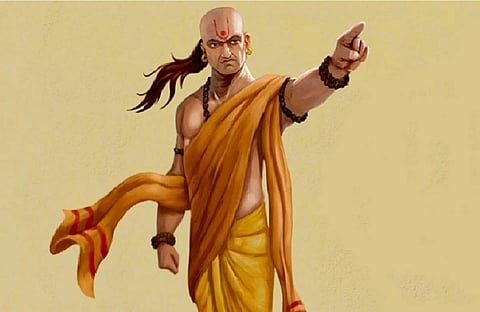

After the shameful political drama in Karnataka a few months back, another farce is unfolding in Maharashtra. A major part of the media is unashamedly calling the politicians involved in this sham as modern-day Chanakyas.
Though the brazen skulduggery may shock the naïve, Indian history is full of such amoral acts. The parties that cry hoarse about democracy being murdered are the ones who made butchering democracy a routine affair while in power.
India, as a culture, is mindbogglingly amoral. The classic Sanskrit play, Mudrarakshasa, deals with the political struggle between Chanakya and his nemesis, Amatya Rakshasa. Chanakya takes the help of King Parvateswara to take on the might of King Nanda of Pataliputra. Some historians identify Parvateswara as Porus or Pururavas, who had lost to Alexander and who later allied with him against other Indian kings.
The combined forces of Chanakya’s protégée Chandragupta and Parvateswara defeat King Nanda. Chanakya had promised Parvateswara that he would divide Nanda’s empire between Chandragupta and him. What we see next is an infamous midnight operation. Chanakya sends Visha Kanyas (poisonous maidens) to Parvata’s chamber in the guise of arranging pleasure for the king. They poison Parvata.
The assassinated king’s son Malayaketu wants to avenge his father’s death and takes the help of Amatya Rakshasa. To create schism in Parvateswara’s household, Chanakya offers half the kingdom to Vairochaka, the younger brother of Malayaketu. In an vicious early morning operation on the day of his coronation, a freak accident kills Vairochaka. Chanakya claims that Rakshasa had tried to kill Chandragupta and Vairochaka is a poor victim of Rakshasa’s conspiracy. Rakshasa strikes back by sending a series of assassins to finish Chandragupta.
Chanakya wants to bring Rakshasa to Chandragupta’s side and weaken Malayaketu. But none of his inducements of power, position or money work on the principled Rakshasa. Chanakya decides to isolate Rakshasa from his allies. A drama is played in the court of Chandragupta, where the king expels Chanakya and openly praises Rakshasa, saying he would have been better off with Rakshasa as the prime minister instead of Chanakya. Meanwhile, Chanakya fabricates evidence to show that Rakshasa is willing to sacrifice Malayaketu and join Chandragupta’s camp. Malayaketu falls for this deceit and expels Rakshasa.
However, even this does not make Rakshasa change sides. Chanakya unleashes the next weapon. Chandragupta’s secret service captures Rakshasa’s close friend Chandanadasa on fabricated charges. The king announces the date of his execution. Rakshasa obtains his release by surrendering himself and agreeing to become the deputy to Chandragupta.
The uncanny similarities to current affairs are deceptive. This has been the nature of Indian politics in every era. And for us, it has always been the Chanakya, and not the principled Rakshasa, the hero. Even a cursory reading of Arthashashtra and Chanakya Niti will give us an idea that Chanakya would have excelled in a more spectacular fashion in the present-day politics.
Books of ancient world, irrespective of their place of origin or culture, are mostly misogynistic, arbitrary, discriminatory and elitist. Chanakya is no exception. Unarguably, Indian religious books and literature, like holy books of other religions, have their share of high ideals peppered here and there, along with stories and exhortations that are unpalatable to a modern mind. One can selectively quote them and say what a high ideal our ancestors had and how low we have fallen. That would be like someone reading the election manifestos of our political parties after a few thousand years and wondering how great the political parties of 21st century India were.
Politics always has been a game of ruthlessness, cunning and amorality in all parts of the world. It was only perhaps in India that deceit wore the cloak of righteousness. The only thing that mattered in our country was to win somehow. That is what Chanakya did in his life, the high ideals that he professed in his books notwithstanding. That is what Krishna, through his actions in the Mahabharata war, teaches us. Anyone familiar with the war knows that every warrior in the Kaurava side was killed using deceit. Rama, the epitome of dharma and maryada, had to hide behind a tree to vanquish Baali. Rama depended on the betrayal of Vibhishana to kill Ravana.
Vibhishana is celebrated as a great devotee and a righteous man. Jaichand was the Vibhishna for Ghori, Mir Jafar was the Vibhishana for the British. Vibhishana in the opponent’s camp is what each political party in India is searching for. Vibhishana in one’s own camp is what the political doyens of modern era fear the most. The ugly political manoeuvring we see are just Indian things.
The politician continues to play the same deceitful game of thrones, because he knows how to fool us. He knows how to keep us away from thinking about things that matter, like unemployment, crumbling economy, grinding poverty, illiteracy, law and order, pollution and poor health.
He keeps us busy fighting and hating each other in the name of religion, place of worship, caste and language, while he fattens himself. For all his mischief, he gets praised. It is a shame that we celebrate such brazen decay, but then, perhaps that is what we have always been.
The rot what we see is the rot inside us, as a culture, as a civilisation and as a society. These politicians didn’t fall from the sky. They are us. We all are Chanakyas with our own level of competence, ruthlessness and deceit. We have ourselves to blame for the politicians we have got.
In the past, the common people were at the mercy of the ruthless manipulators who won by hook or by crook. The moment we stop gushing over the cunning of our politicians, we will realise that we now have a tool to show our politicians a better path—our vote. If only we knew how to use this Brahmastra well. mail@asura.co.in